Electrical & electronics Measurement Lab
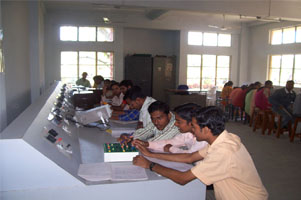 Objectives:
Objectives:
- Our graduates will be able to excel in professional career by acquiring knowledge in electrical engineering principles
- Our graduates will be able to use their skills with a strong base to prepare them for higher studies and research
- Our graduates will be able to establish themselves as practicing professionals in electrical engineering or sustain a life -long career in related area
- An ability to design and conduct experiment as well as to analyzes and interpretation of data
- A knowledge of contemporary issues
- An ability to function in multi -disciplinary teams
- An understanding of professional and ethical responsibility
- Voltmeter,ammeter,wattmeter,energymeter
- LCR Q-Bridge
- Schering Bridge
- Anderson Bridge
- Spectrum analyzer
Control System Lab
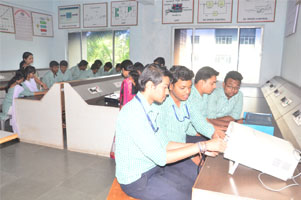 Objectives:
Objectives:
- To help the students understand and practice the modeling, simulation and implementation of a physical dynamical system.
- To motivate the students to practices which includes the use of control design strategies for improving manufacturing process the efficiency of energy use advance automobile control, including rapid transit, among others
- The practical and wide application of control system might leads some students to choose it as a research topics of interest.
- Students will demonstrate an ability to apply knowledge of mathematics, science and engineering.
- Students will demonstrate the ability to interest and communicate effectively with peers in the group.
- DC position control system, P,PI,PID control system, Relay control system, Temperature control system, CRO
Electric Drives Lab
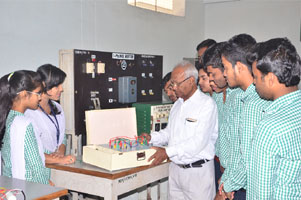 Objectives:
Objectives:
- Describe the structure of Electric Drive systems and their role in various applications such as flexible production systems, energy conservation, renewable energy, transportation etc., making Electric Drives an enabling technology.
- Understand basic requirements placed by mechanical systems on electric drives.
- Review phasors and three-phase electric circuits.
- Understand the basic principles of power electronics in drives using switch-mode converters and pulse width modulation to synthesize the voltages in dc and ac motor drives.
- Understand the basic concepts of magnetic circuits as applied to electric machines.
- Understand the two basic principles (generation of force and emf) that govern electromechanical energy conversion.
- Describe the operation of dc motor drives to satisfy four-quadrant operation to meet mechanical load requirements.
- Design torque, speed and position controller of motor drives.
- Clearly learn to use space vectors presented on a physical basis to describe the operation of an ac machine.
- Understand the basic principles of Permanent Magnet AC (Self-Synchronous AC) drives.
- Describe the operation of induction machines in steady state that allows them to be controlled in induction-motor drives.
- Learn speed control of induction motor drives in an energy efficient manner using power electronics.
- Learn the basic operation of stepper motors and switched-reluctance motor drives.
- Learn about the energy efficiency of electric drives and inverter-motor interactions.
- SINGLE PHASE FULL WAVE CONTROLLED RECTIFIER
- THREE PHASE FULL WAVE CONTROLLED RECTIFIER
- SINGLE PHASE DUAL CONVERTER
- THREE PHASE SQUIRELL CAGE INDUCTION MOTOR
- MOTRO-GENERATOR SET
Electrical Machine Lab
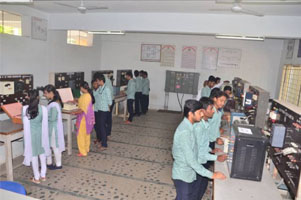 Objectives:
Objectives:
- Information to supplement to the Electric Machines.
- The ability to conduct testing and experimental procedures on different types of electrical machines.
- A chance to practice different types of wiring and devices connections.
- The capability to analyze the operation of electric machines under different loading conditions
- Understand the concept of efficiency and the short circuit impedance of a three-phase transformer from no-load test, winding resistance, short circuit test, and load test
- Understand the effect of unbalanced loading on a three-phase transformer with different connections, and the effects and limitations of each connection.
- Study series and parallel connections of three-phase transformers.
- Experimentally obtain the load characteristics of various dc motors and generators.
- Experimentally obtain the load characteristics, starting current and starting torque of a squirrel-cage induction motor and to derive circuit parameters from no-load and blocked-rotor tests.
- DC Shunt Motor(5 H.P),Single Phase Induction Motor (5 H.P)
- DC Shunt Motor - 3 Phase Alternator Set(5 H.P, 17 AMP)
- Slip Ring-Squirrel Cage Induction Motor (5 H.P)
- Synchronous Motor-DC Shunt Motor Set (5 H.P)
Network Device Lab
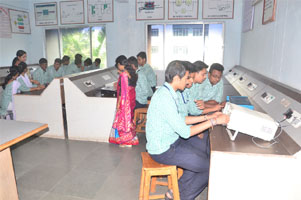 Objectives:
Objectives:
- To enable students to gain skills in using basic laboratory equipments such as meters, power supplies, oscilloscopes.
- To make the students aware of the limits of the operation of components & equipments.
- To verify some of the concepts presented in the co requisite course either EEL 3111 or EEL 3003.
- To give the students self-confidence in electrical laboratories.
- The laboratory equipments in circuit theory course are dedicated for practical understanding of circuit theory concept.
- Linking of the circuit theory with practice.
- It is very important to motivate the students for learning theory and to encourage them to use this theory knowledge in practical activities.
- To give a fundamental understanding on basic electrical circuit laws in mathematical way.
- Experimentally obtain the load characteristics, starting current and starting torque of a squirrel-cage induction motor and to derive circuit parameters from no-load and blocked-rotor tests.
- Measuring equipments like multimeter,voltemeter,ametter,wattmeter etc.
- Signal sources,CRO,Function Generator,Filter circuit,Variac,Rheostat,Transient kiit,Transformer etc.
Power Electronics Lab
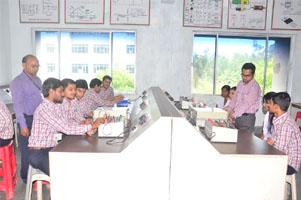 Objectives:
Objectives:
- To introduce basic Topology of Power switching Circuits.
- Introduce Hardware used in Power Electronics switching circuit and Power Conditioning System
- Acquire knowledge about fundamental concept & techniques used in Power Electronics.
- Ability to analyze various single phase & Three phase Power Converters circuits and understand their application
- To develop skills o build and troubleshoot Power Electronics Circuits
- Foster ability to understand the use of Power Converters in Commercial & Industrial Application.
- SCR,TRIAC,DIAC,MOSFET CHARACTERISTICS STUDY UNIT
- THREE PHASE CONTROLLED RECTIFIER POWER CIRCUIT
- THYRISTOR FORCED COMMUTATION TRAINER KIT
- R,R-C & UJT FIRING MODULE
- CRO
Power System Lab
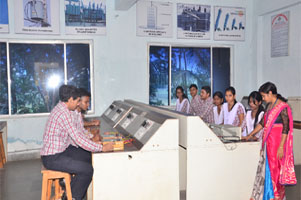 Objectives:
Objectives:
- To allow students to practically verify several concepts and procedures learned in power system modelling analysis.
- To carry out system studies using state of the art power system analysis software to access system operation in steady state and under faulted condition.
- Understand how to measure electrical parameters characteristics of a 3-phase transmission line.
- Practically know the procedure used in preparing transmission line, load and generator data for a load flow system study.
- Know how to carry out a short circuit analysis study for symmetrical and unsymmetrical faults and are able to interpret the results of the analysis.
- Fault analysis of 3- phase alternator.
- IDMT characteristic of over current relay.
- Characteristics of percentage biased of static/electromagnetic differential relay.
Project & Research Lab
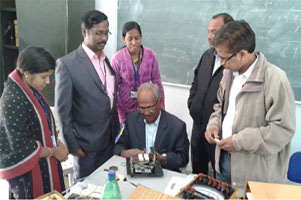 Objectives:
Objectives:
- To develop specialized manpower for electrical power and energy industry.
- To enhance analytical skills so as to enable to solve complex industrial problems.
- To augment the students’ capacity in pursuing research in emerging areas of power system.
- To improve students’ perspective towards environmental issues by sensitizing and building the awareness of green technologies.
- To inculcate the culture of research oriented projects with state-of-art facility laboratories in power system.
- Work in power industry which is involved with the aspects of generation, transmission, and distribution.
- Shoulder responsibilities in planning and utilization of electrical energy.
- Design of electrical systems.
- Analyze and model the complex electrical systems.
- Expose to the recent state-of-art in electrical engineering.
- Contribute in academics.
- Undertake research in emerging areas of power systems.
- Use recent soft tools in analysis of power system problems.
- Deploy knowledge and skills in inter-disciplinary areas.
- Understand the importance of financial aspects in power system infrastructure development.
- Appreciate the impact of industrial activities on global warming and finding the sustainable technical solutions.
- DESIGN AND ANALYSIS OF SPEED CONTROL OF PMDC MOTOR USING PWM/SPWM TECHNIQUE
- STUDY OF PWM BASED SINGLE PHASE AC INDUCTION MOTOR WITH CLOSE LOOP CONTROLLER
- SPEED CONTROL OF AC MOTOR USING SCR/ TRIAC AC VOLTAGE REGULATOR
- MULTI SPEED & BI-DIRECTIONAL STEPPER MOTOR DRIVE
- MICROCONTROLLER BASED SINGLE PHASE CYCLO-CONVERTER
- THREE PHASE INVERTER DESIGN 120 DEGREE AND 180 DEGREE MODE
- STANDALONE PV SYSTEM
- POWER FACTOR CORRECTION USING BOOST CONVERTER
- SLIDING MODE CONTROLLER DESIGN AND SPEED CONTROL OF DC MOTOR
- SUN TRACKING SOLAR SYSTEM DESIGN
Machine Design & Simulation Lab
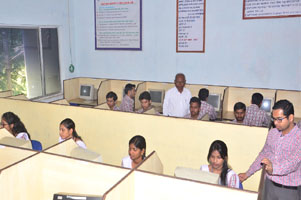 Objectives:
Objectives:
- To learn about the major components of MATLAB environment.
- To simulate a dynamic system represented in block diagram form and observe the result of simulation.
- To obtain time response of dynamic system for different types of test input.
- To obtain frequency response of dynamic system.
- To design the transformer using MATLAB.
After going through the laboratory student will get idea of the following:
- Major components of MATLAB and simulink environment.
- Create model of a dynamic system in the simulink window.
- Create simulink model of different control system and power electronic devices.
- Design the transformer using MATLAB
Automation Lab
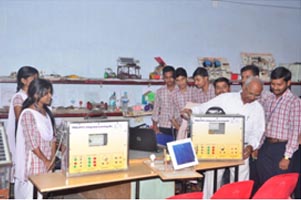 Objectives:
Objectives:
- Automation plays a major role in industry for making defect free products with improved productivity.
- To familiarize in fluid power automation and different components of Hydraulics, pneumatics, electro hydraulic / electro pneumatic and PLC based systems.
- To give hands on experience in designing and executing of circuits for real systems. The virtual simulation experiments are based on electro pneumatic, electro hydraulic and PLC based systems .
- It has become a game changer in the modern day molecular lab for ease-of-use and state-of-the-art functionality. Automation can be a huge advantage for lab directors, but it must be used carefully and monitored appropriately.
- Faster, more accurate results
- Workflow efficiency and personnel benefits
- PLC Controlled material handling system
- Electro Pneumatic trainer kits
- NI CDAQ for data acquisition

